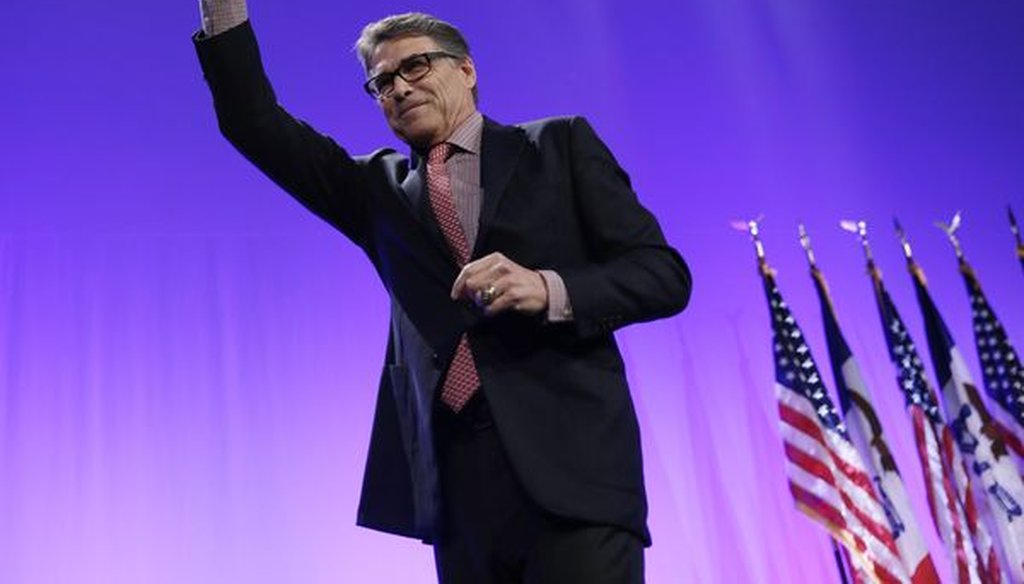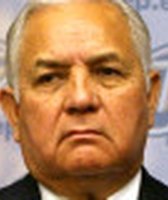Stand up for the facts!
Our only agenda is to publish the truth so you can be an informed participant in democracy.
We need your help.
I would like to contribute

Former Texas Gov. Rick Perry waves after speaking to an Iowa crowd in May 2015 (Associated Press photo).
We've been checking job-gain claims by Rick Perry as long as there's been a PolitiFact Texas Truth-O-Meter.
With Perry widely expected to announce for president this week, let's quickly cover a couple highlights.
In early 2009, Perry said approximately 70 percent of the jobs created in the U.S. from November 2007-November 2008 were in Texas. False, we found, in that Perry did not consider job gains in more than 30 states that experienced net job losses.
That is, Texas's 221,000 net new jobs in the year amounted to 71 percent of the 310,000 jobs gained in the year in the 14 states and the District of Columbia. Other states with net job gains were Oklahoma, Maryland, Louisiana, Wyoming, Kansas, Colorado, North Dakota, South Dakota, New Hampshire, Iowa, Virginia, Alaska and Nebraska. However, we confirmed, Perry's equation did not consider any new jobs created in 36 states where job losses overall outnumbered gains through the 12 months.
Perry, governor from late 2000 into early 2015, continued to boast about the state's economy on his watch and in May 2013, he drew a True rating for his claim that over the last 10 years, Texas had "created 33 percent of the net new jobs nationwide." Perry made this claim in an ad urging President Barack Obama to consider the Texas economic model. The ad said that while the U.S. lost 2.5 million net new jobs over the past five years, Texas created 530,000 net new jobs.
To our inquiry, a regional economist for the federal Bureau of Labor Statistics, Cheryl Abbot, confirmed the net job gain figures. According to a spreadsheet she emailed our way, Texas had topped 42 states with net job gains in the period, considerably outdistancing the No. 2 jobs-gainer, New York, which had a net gain of 458,000 jobs. States with net losses were Connecticut, Illinois, Maine, Michigan, Missouri, New Jersey, Ohio and Rhode Island.
Abbot also cautioned the bureau steers clear of using its employment estimates to declare how much of any national job gains are attributable to net job gains in individual states. That judgment has to do with technical difficulties comparing the results of surveys undertaken state by state to research intended to have national sweep. Regardless, she said, "Texas has been a very powerful job creator; during the period, the state created 1.75 million net jobs – and that was equal to one-third of the net jobs created nationwide," which is slightly different from saying the state accounted for 33 percent of national net jobs gained.
Among the states, Texas had the third-greatest percentage gain in jobs over the decade, 19 percent, trailing North Dakota (33 percent increase) and Utah (21 percent), the spreadsheet showed.
At our request, Jason Abrevaya, who chairs the University of Texas Department of Economics, reviewed the bureau figures. He said by email that they seemed to hold up. If Texas had been performing at the average nationwide from 2003 to 2013, Abrevaya added, one "would expect the state to account for roughly 8 percent," rather than 33 percent, of the net job changes, since Texas accounts for about 8 percent of the nation’s jobs.
Texas was less hard-hit by the Great Recession of 2007-08 than many states though unemployment did spike on Perry's watch:
SOURCE: Website, "Databases, Tables & Calculators by Subject," U.S. Bureau of Labor Statistics (June 1, 2015 download)
This May, Perry told a crowd in Iowa: "From the end of '07 through the end of 2014," a period covering the second half of his governorship, "we created 1.5 million jobs. Juxtaposition that with what was happening across the rest of this country. They lost 400,000 jobs." We started looking into that only to have Perry's spokeswoman, Lucy Nashed, remind us by email that we'd already looked into similar figures earlier in the year, finding Mostly True a Perry claim that starting in December 2007, "1.4 million jobs were created in Texas. In that same period, the rest of the country lost 400,000 jobs." An outside economist separately counseled more perspective, pointing out that since the end of the recession in February 2010, the U.S. as a whole had added more than 10 million jobs with Texas accounting for more than 1 million of the additions.
Perry also talks about employment nationally. In a January speech in Iowa, Perry said the U.S. unemployment rate has "been massaged, it’s been doctored." That’s Pants on Fire, we held.
There’s legitimate debate about what statistic best measures the state of the workforce and even agreement that the widely quoted unemployment rate (which Perry stressed as meaningful about a week before this Iowa stop) doesn’t provide the fullest picture of the labor force. But that's a far cry from showing the government is massaging or doctoring numbers, which implies organized underhanded wrongdoing.
Our Sources
See the linked Truth-O-Meter articles.









































